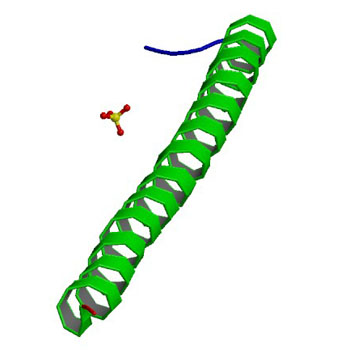Candidate Drug Kills CRCs with Mutated Tumor Suppressor Gene
By LabMedica International staff writers
Posted on 04 Nov 2016
A candidate small molecule drug for treatment of colorectal cancer acts by blocking cholesterol biosynthesis in a subset of tumor cells that carry a mutated version of a gene that normally suppresses tumor formation.Posted on 04 Nov 2016
Mutations in the adenomatous polyposis coli (APC) gene are common in colorectal cancer (CRC) - they are found in more than 80% of colon tumors - and more than 90% of those mutations generate stable truncated gene products.

Image: The protein produced by the adenomatous polyposis coli (APC) tumor suppressor gene (Photo courtesy of Wikimedia Commons).
To identify candidate drugs capable of killing CRC cells with mutated APC, investigators at the University of Texas Southwest Medical Center (Dallas, USA) screened more than 200,000 compounds against a panel of normal human colonic epithelial cells (HCECs) and a series of oncogenically progressed HCECs containing a truncated APC protein.
They reported in the October 19, 2016, online edition of the journal Science Translational Medicine that a small molecule, TASIN-1 (truncated APC selective inhibitor-1), specifically killed cells with APC truncations but spared normal and cancer cells with wild-type APC. TASIN-1 exerted its cytotoxic effects through inhibition of cholesterol biosynthesis.
In vivo administration of TASIN-1 inhibited tumor growth of CRC cells with truncated APC but not APC wild-type CRC cells in xenograft models and in a genetically engineered CRC mouse model with minimal toxicity.
"Even though such mutations are common in colorectal cancer, there are currently not any therapeutics that directly target these types of mutations, so this represents fresh avenues to approach," said senior author Dr. Jerry W. Shay, professor of cell biology at the University of Texas Southwest Medical Center. "Our latest finding confirms that targeting TASINs is a viable approach. Considering the high prevalence of APC mutations in colon cancer patients, targeting truncated APC could be an effective therapeutic strategy for prevention and intervention of colorectal cancer and could potentially be used as a marker for stratifying patients in future personalized medicine clinical trials."
Related Links:
University of Texas Southwest Medical Center













